

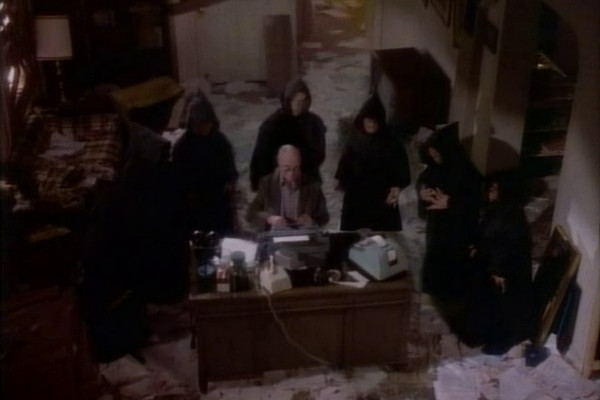
Undoubtedly indulgent yet witty with it, Personal Demons, written by Rockne O'Bannon, features a writer called... Rockne O'Bannon. In real life O'Bannon was just entering his thirties and was making his television debut as a writer with the series, but his fictional counterpart, played by Martin Balsam, is an embittered, weary old man who has been in the profession for three decades, plagued by apparations.
Balsam wasn't a newcomer to the series, having appeared in two of the original series episodes: The 16mm Shrine and the classic The New Exhibit. It's somewhat unfortunate that the masks on the literal personal demons are so cheap, causing the episode to be quirkily charming, rather than reaching its full potential of genuinely unsettling.
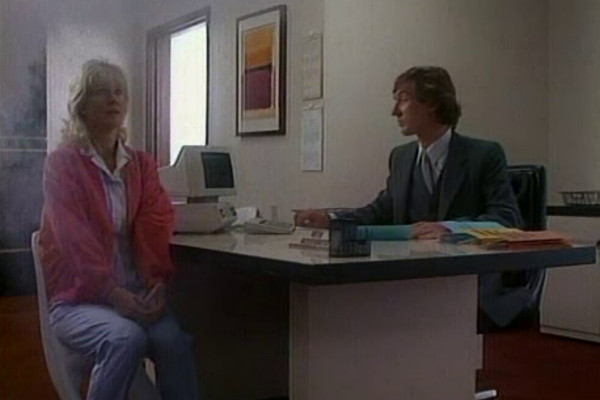
A brief yet witty tale that places the world of genies and magic lamps into red tape and bureaucracy. Just coming in at over eight minutes, it's slight but engaging, and, while incredibly lightweight, narratively satisfying.
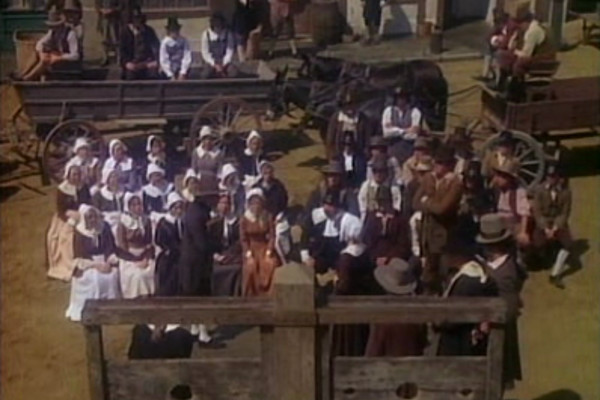
A fairly sweet tale sees a modern day youth develop a cross-time telepathic connection with Charity, a girl from the 1700s when both fall under a delirious fever. While such an unlikely event is accepted all too readily, it does lead to a likeable friendship and some interesting developments as Charity's secret is discovered and she is believed to be a witch.
While all of the characters from the 18th century talk like a drier, less fun version of Catweazle, it's an episode that works its charm, even if the 80s synth music by Basil Poledouris is completely at odds with the tone of the material. Poledouris had a successful career, working on many major motion pictures... but then, it's unlikely people remember Robocop or Starship Troopers for their score.
Among the 22 commentary tracks on the DVD release, A Message From Charity is the only one to feature a member of the cast, as Charity herself, Kerry Noonan, sits in with Philip DeGuere and reveals an impressive amount of historical knowledge.
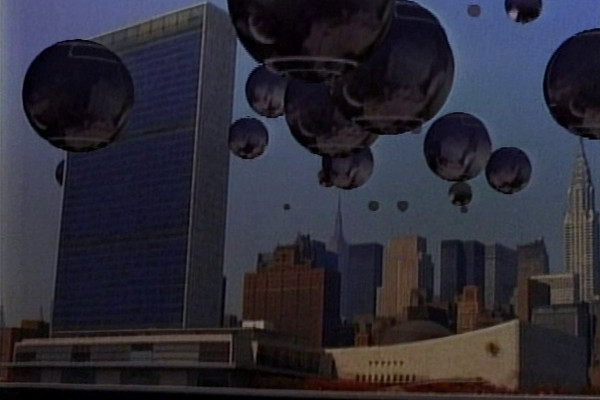
A worthwhile story with a fairly clever twist, A Small Talent For War is nevertheless just a scrap of a story, lasting less than eight minutes. With the 24 episodes containing between two and three stories each, the 1985 season often seems to discard the tradition of beginning-middle-end and just opts for half-developed narratives to fill its runtime.
It's also important to note that the season doesn't actually look good, and contrasts badly with the film quality of the original. The 1985 season was also shot on film, but then transferred to video to make the special effects cheaper. Sadly, the video stock has worn badly, even when restored for DVD, and looks even worse when screened on television in the UK, where the conversion from NTSC to PAL renders the entire picture muddy. As pictured, this produces some less than satisfying results: crude, rudimentary UFO effects created on video and placed over a converted film stock.
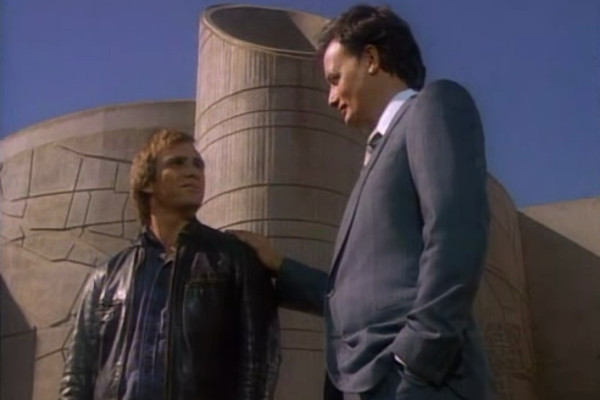
A real treat for cult TV fans, as Star Trek: The Next Generation's John DeLancie and Brent Spiner get to act alongside Steve Railsback, aka Duane Barry from The X-Files... although obviously some years before any of them got to play those roles. Railsback plays a trucker tasked with moving the sprightly undead into slavery compounds, which is literally Hell on Earth.
Although Zombie films had fallen slightly out of vogue in the early 80s, 1985 saw notable new entries in the genre, with films including The Return of the Living Dead, Re-Animator and Romero's Day of the Dead. Although it's tempting to suggest that there was a parallel between these events, the actual script was based on a short story by Greg Bear which was first published in April 1985, so such things are a coincidence, no more.
Although the music by Merl Saunders is a little too syruppy for the subject matter, and there's a somewhat murky feel to proceedings, a Twilight Zone that dares to criticise religion has to be commended for bravery, particularly as this one stretches the boundaries further by mentioning "hookers" and giving us the series' first openly gay character.
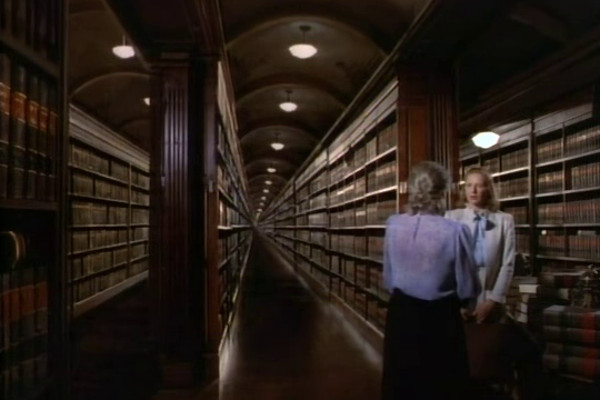
A likeable concept, whereby a would-be writer takes up a post as a librarian in a library filled with the books of everyone's lives. When curiosity gets the better of her, she begins to make changes to affect her friends and neighbours, but the intertwined nature of peoples' lives means she has to constantly change other books in order to keep everything on track. Ultimately it can be a little pedestrian in execution, and perhaps doesn't go anywhere completely unexpected, but it's a nice concept, decently told.
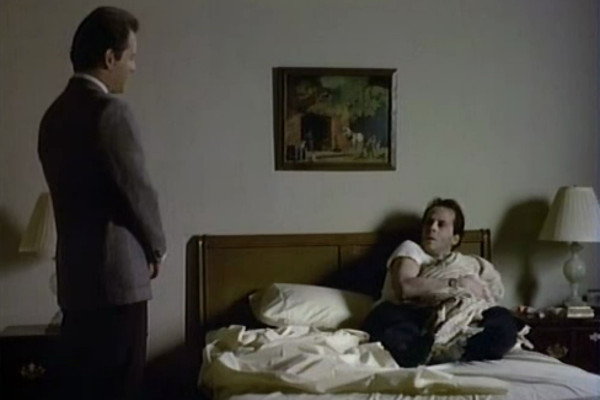
The series opening episode began with a dual role story for Bruce Willis, directed by Wes Craven. It's important to note that this wasn't Bruce Willis the Hollywood star, but a Bruce Willis who had had two uncredited roles in movies, and only seven episodes of Moonlighting had aired by the time it was broadcast. Watched today, and it seems like the programme pulled out all the stops for its opening night by having a major star launch it, whereas the reality was he was just a working actor, relatively unknown, like so many others in the show. This particular story opens with a nice gambit - what if you called home, and yourself picked up the other end of the line? - but doesn't really go anywhere particularly interesting beyond the initial premise. Thankfully the first episode was a double bill with the superior A Little Peace And Quiet, which meant the programme got off to a good start, even if it never became a huge ratings success.
One thing the 1980s show got very right was an eerie title sequence, aided by a striking new rendition of the theme tune by the Grateful Dead and Merl Saunders. The combination of the 60s band and Merl Saunders went on to provide incidental music for thirteen season one episodes, while Saunders was solely responsible for the music of half a dozen more. This first episode contains music by Saunders with three members of the Grateful Dead: Jerry Garcia, Bob Weir and Mickey Hart.
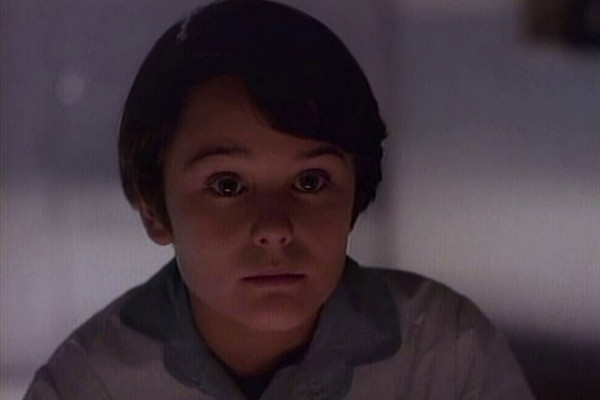
"I love you, Dicky... I love you so much."
Perhaps a different name could be used for the child, lest the truly puerile get some cheap laughs from lines such as the one above. Nevertheless, this is a fine episode, whereby children are executed by the state based on their tested intelligence. While such things may seem far-fetched, it's also oddly plausible, and what should be a relatively pedestrian episode is elevated by a great twist.